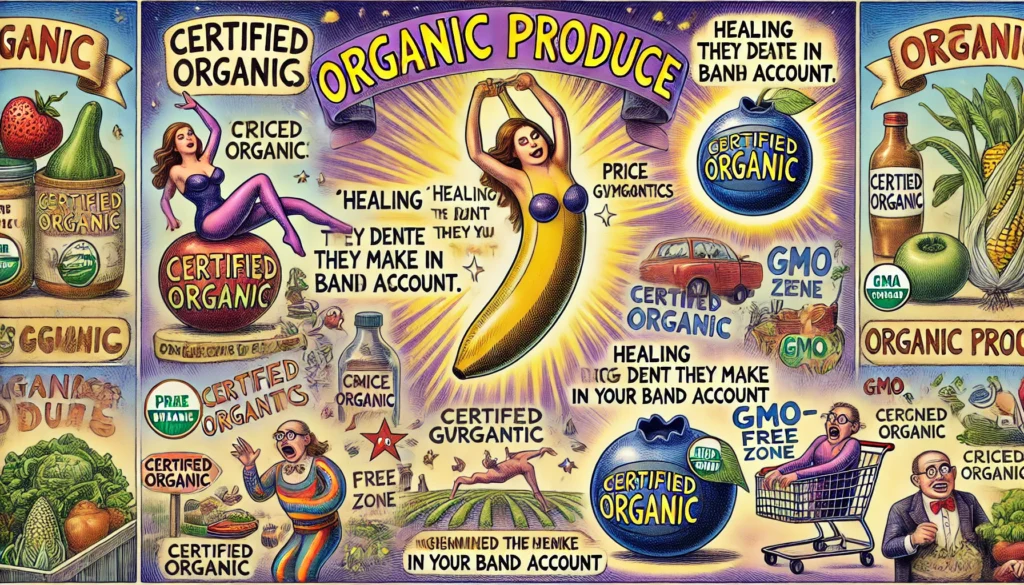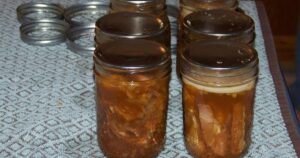
Is Organic Produce Worth the Higher Price A satirical illustration in the style of Mad Magazine titled Organic Produce. Various scenes lampooning the high prices and marketing of organic foo2.webp.webp
Is Organic Produce Worth the Higher Price?
Farmers and Shoppers Weigh In
Clickbait Headline:
“Is Organic Produce Worth Its Weight in Gold? Farmers and Shoppers Get Real!”
Introduction
In the bustling world of grocery stores, farmers’ markets, and the ever-mysterious USDA certification process, one question reigns supreme: Is organic produce really worth the higher price? As shoppers clutch their wallets and farmers scratch their heads, the saga of organic vs. conventional continues to unfold with humor, confusion, and the occasional mystical blueberry.
Price Tag Gymnastics
Buying organic produce is like a financial workout; you’ll flex your wallet more than your muscles. Maria, a committed organic shopper, shares her weekly struggle. “It’s like doing CrossFit for my bank account. By the time I reach the checkout, I’ve done more mental gymnastics than a mathlete at a calculus competition.” Indeed, the price tags on organic fruits and vegetables seem to have their own Olympic event: how high can they go?

Sticker Shock
The USDA Organic sticker doubles as a price warning: “Prepare to pay double!” Bob, a thrifty shopper, recounts his first experience buying organic bananas. “I saw the sticker and thought, ‘This banana must be a superhero!’ Turns out, it’s just really good at making my wallet disappear.” The sticker shock is real, leaving many to ponder if the organic label is just a fancy way of saying, “expensive.”
Mystical Blueberries
Organic blueberries are said to have healing properties—mainly healing the dent they make in your bank account. Lisa, a health enthusiast, swears by their magical effects. “I eat a handful of organic blueberries every morning. They’re like tiny, expensive miracles in a bowl.” Despite their high cost, the belief in their mystical health benefits keeps shoppers coming back for more, even if it means sacrificing a few other luxuries, like gas or rent.

Banana Certification
A certified organic banana? It’s basically a yellow badge of honor for fruit. Farmers like Carl take pride in their organic certification. “That sticker means this banana went through more inspections than a celebrity at airport security.” The process of getting certified is rigorous, involving paperwork, inspections, and a level of bureaucracy that would make even the most seasoned politician wince.
GMO-Free Zone
Organic produce is proudly grown without GMOs, but sometimes you wonder if it’s also grown without any sense of affordability. Jane, a mother of three, laments the high cost of feeding her family organic produce. “I love that it’s GMO-free, but does that have to mean it’s also free of any budget-friendly options?” The struggle to balance health and finances is a common theme among shoppers.
Farmer’s Market Detective
Asking farmers about their growing techniques feels like playing Sherlock Holmes in a straw hat. Nancy, a dedicated farmer’s market regular, describes her weekly ritual. “I approach each stall with the precision of a detective. ‘Were these tomatoes rotated during the full moon? Did the carrots receive positive affirmations?’ It’s exhausting but worth it for the peace of mind.” The quest for organic transparency turns every shopper into a part-time sleuth.
Synthetic Fertilizer Villain
Synthetic fertilizers are the Darth Vader of the farming world, organic ones are the Jedi Masters. Farmer Tom explains the battle between synthetic and organic. “Using synthetic fertilizers is like joining the dark side. Sure, it’s powerful, but it’s not the way of the Jedi. Organic farming is all about balance, harmony, and a bit of yoga for the soil.” The metaphor may be stretched, but the sentiment is clear: organic farming is the noble, albeit expensive, path.
Rotating Crops
Rotating crops sounds like a fancy dance move—no wonder organic produce is so expensive, it’s been to dance class! Farmer Sally gives a peek into her daily routine. “Every season, it’s like we’re choreographing a new routine. ‘The corn goes here, the beans over there, and don’t forget to twirl the tomatoes!’ It’s hard work, but it keeps the soil healthy and the produce delicious.” The labor-intensive nature of organic farming is often reflected in its higher price.
Cover Crop Confusion
Cover crops? More like undercover crops. They’re the secret agents of organic farming. Farmer Joe chuckles as he describes his cover crops. “These plants are like ninjas—silent, unseen, but incredibly effective. They keep the soil fertile and the weeds at bay without anyone even noticing.” The concept of cover crops may be confusing to some, but their benefits are undeniable.

Climate Crusader Carrots
Organic carrots are the eco-warriors of the vegetable world, singlehandedly saving the planet, one crunch at a time. Environmentalist Emma praises the climate benefits of organic farming. “Every organic carrot you eat is a tiny victory for the planet. It’s like Captain Planet, but in root vegetable form.” The idea of saving the world one carrot at a time might seem far-fetched, but for many, it’s a cause worth supporting.
Nitrous Oxide Nuisance
Both synthetic and natural fertilizers release nitrous oxide, which is the greenhouse gas equivalent of a whoopee cushion. Dr. Greenfield, an environmental scientist, explains the impact. “Nitrous oxide is no laughing matter, even if it sounds like one. It’s a potent greenhouse gas, and organic farming tries to minimize its release.” The challenges of sustainable farming are complex, but the effort to reduce emissions is crucial.
Budget Blues
The real dilemma is deciding whether the organic apple is worth more than the extra gallon of gas you’ll need to buy it. John, a budget-conscious shopper, faces this decision every week. “I stand there in the produce aisle, apple in one hand, gas receipt in the other, wondering which one will hurt less.” The constant balancing act between health and affordability is a source of frustration for many.
Fraud-Proof Fantasy
The USDA seal isn’t entirely fraud-proof, but it does offer a nice illusion of security for your extra dollars. Consumer advocate Laura highlights the challenges. “While the certification process is rigorous, it’s not foolproof. There have been instances of fraud, but the seal still provides a level of trust.” The reality may be imperfect, but for many, the USDA seal is a comforting sign of quality.

Organic Envy
Organic produce makes regular veggies feel like they missed the VIP invite to the health club. Farmer Jake jokes about the perceived superiority of organic produce. “It’s like the regular tomatoes are standing outside the club, watching the organic ones get all the attention. They’re just as tasty, but without the fancy label.” The social dynamics of produce might be exaggerated, but the sense of exclusivity around organic food is real.
Sustainability Circus
Navigating the world of organic and sustainable produce feels like attending a circus, where you’re never quite sure who the real ringmaster is. Shopper Alice expresses her confusion. “One week it’s all about organic, the next it’s sustainable, then local. It’s like a never-ending parade of buzzwords.” The circus of sustainability can be overwhelming, but it’s a performance that many feel compelled to attend.
The Farmer’s Perspective
Behind the humorous observations lies the reality of farming. Organic farmers like Sarah and Michael dedicate their lives to producing high-quality food while adhering to strict standards. “It’s not just about the price tag,” Sarah says. “It’s about the health of our soil, the welfare of our animals, and the quality of the food we produce.” The commitment to organic farming goes beyond economics; it’s a philosophy and a way of life.
Shopper Dilemmas
For shoppers, the decision to buy organic is a complex one. As grocery bills rise, even the most committed organic enthusiasts are forced to make tough choices. “I used to buy everything organic,” says Emily, a mother of two. “Now I have to pick and choose. Do I get the organic apples or the organic spinach? It’s like a cruel game of vegetable roulette.”
The Role of Education
Education plays a crucial role in helping consumers make informed choices. “Understanding what ‘organic’ really means is key,” says nutritionist Dr. Roberts. “It’s not just a label; it represents a commitment to certain farming practices that benefit the environment and potentially our health.” Workshops, online resources, and farmer’s market conversations can all help demystify the organic label.
The Future of Organic Farming
The future of organic farming is a topic of much debate. Some experts believe that as technology improves and demand increases, the cost of organic produce will decrease. “We’re seeing innovations in organic farming that could lower costs,” says agricultural scientist Dr. Patel. “From advanced composting techniques to better crop rotation strategies, the future looks promising.” Others argue that the premium price is here to stay, reflecting the true cost of sustainable farming.
Community Support
Community-supported agriculture (CSA) programs offer a solution for those looking to support organic farming without breaking the bank. “Joining a CSA has been a game-changer for us,” says Jennifer, a CSA member. “We get fresh, organic produce every week, and it’s more affordable than buying at the store.” CSAs provide a direct connection between consumers and farmers, fostering a sense of community and mutual support.
Government Policies
Government policies also play a significant role in the organic farming landscape. Subsidies for conventional farming and regulatory hurdles for organic certification can create an uneven playing field. “We need policies that support organic farmers,” argues activist Mark Jensen. “Subsidies for sustainable practices, easier certification processes, and better education for consumers are all crucial.” Policy changes could help level the field, making organic farming more accessible and affordable.
Environmental Impact
The environmental benefits of organic farming extend beyond the absence of synthetic fertilizers. Practices like crop rotation, cover cropping, and reduced pesticide use contribute to healthier ecosystems.

Originally Published at FarmerCowboy.com
2024-07-01 09:47:30
Originally posted 2024-07-02 10:12:16.
Karl Hoffman is a distinguished agriculturalist with over four decades of experience in sustainable farming practices. He holds a Ph.D. in Agronomy from Cornell University and has made significant contributions as a professor at Iowa State University. Hoffman’s groundbreaking research on integrated pest management and soil health has revolutionized modern agriculture. As a respected farm journalist, his column “Field Notes with Karl Hoffman” and his blog “The Modern Farmer” provide insightful, practical advice to a global audience. Hoffman’s work with the USDA and the United Nations FAO has enhanced food security worldwide. His awards include the USDA’s Distinguished Service Award and the World Food Prize, reflecting his profound impact on agriculture and sustainability.





Farm Radio’s farmer spotlight features some of the most inspiring stories.